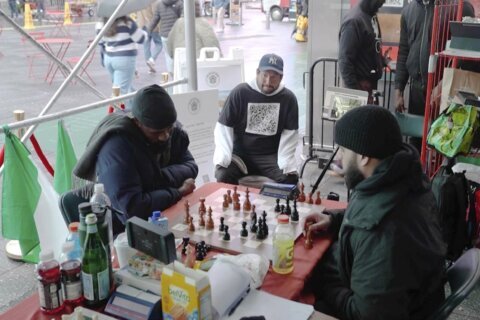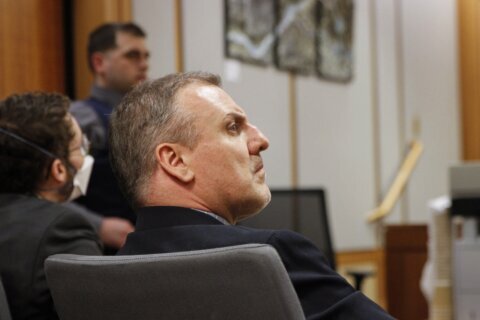ATLANTA (AP) — Prosecutors want jurors to conclude that suspended Georgia Insurance Commissioner Jim Beck was running a $2 million scam to bilk money from the property insurer he led before being elected. Defense attorneys say Beck was actually an innovative executive who led the Georgia Underwriting Association to strong profits and that prosecutors don’t understand Beck’s innovations.
That’s how lawyers on Tuesday kicked off what’s expected to be a two-week trial for Beck in federal court in Atlanta. The Republican was elected insurance and safety fire commissioner in 2018 and then indicted in May 2019, months after taking office. Beck is charged with mail fraud, wire fraud and money laundering.
Before he was elected, Beck was general manager of the Georgia Underwriting Association, an insurer of last resort that covers property owners unable to buy insurance on the regular market. Those regular insurers are co-owners of the GUA, sharing risk of any losses.
Assistant U.S. Attorney Sekret Sneed told jurors in her opening argument that Beck, a cousin and some friends created a series of shell companies that billed GUA for bogus services, with Beck ensuring invoices got paid even though some employees say they never saw any work product. Then the intermediaries sent money back to Creative Consultants or the Georgia Christian Coalition, both of which Beck controlled.
“What is Creative Consultants?” Sneed said. “It’s just a bank account controlled by the Becks.”
Sneed said investigators have concluded that business expenses Beck claimed also were faked.
“You will hear from the IRS that it is impossible that the defendant could have clamed the business expenses he did,” Sneed said.
Instead prosecutors allege Beck spent the money on himself, on investments, on taxes and his insurance commissioner campaign.
“Even the defendant had to keep a flowchart to keep it straight,” Sneed said.
But defense attorneys questioned how Beck could have been stealing from GUA when he turned it from losses to profits, saying he turned around a money-losing outfit, cutting losses by improving the process of underwriting insurance and cutting expenses by lowering the amount GUA paid others for reinsurance. That’s a way of getting other insurers to shoulder some risks.
“The truth is, he modernized the company with innovative business solutions,” defense lawyer Randy Chartash told jurors. “He saved them money; he made them money.”
Chartash said prosecutors must prove Beck intended to harm GUA, not just that some of his methods might have been underhanded.
“Intent to deceive alone, without the intent to cause loss or injury, is not enough,” Chartash said. “Jim Beck made them a profit, a profit they had not made in 40 years. That is not causing a loss or injury, or intended to cause a loss or injury.”
Chartash also said the defense will show the work product of at least some of the contractors named in the scheme, disputing prosecutors’ contention that the outside companies did nothing.
“The evidence shows they did provide work,” Chartash said. “We believe that, in and of itself, will be sufficient to mandate an acquittal.”
The first witness in the case was longtime GUA employee Judy Strickland, who was fired by Beck because he said she made inappropriate remarks to another employee.
Strickland’s testimony focused on invoices from Green Technology Services, a company that said it provided home inspections and data to help GUA judge the risks of various properties. Green Technology Services was owned by Matthew Barfield, a cousin of Beck.
Strickland testified Green Tech’s invoices were unusual because they contained little detail about what the company was providing and that Beck always handed them to her to pay, instead of bills arriving in the mail.
She also said checks were always left for Green Tech at GUA’s front desk to be physically picked up, instead of being mailed to the company’s post office box in Villa Rica.
Defense lawyer Bill Thomas questioned whether Strickland disliked Beck and the changes he made to GUA’s business. Strickland said Beck’s methods were different, but that “I did not have a problem with it.”
Georgia Gov. Brian Kemp, a fellow Republican, called on Beck to resign a day after his indictment. Beck voluntarily suspended himself from office but said he was innocent and not resigning. Beck has continued to collect a state salary of about $200,000 even as the state has also been paying John King, appointed by Kemp to serve as commissioner, King is running in 2022 to keep the job.
Beck is also accused of using more than $4,000 from the Georgia Arson Control Program to pay for 1,500 campaign signs when he was running for insurance commissioner.
___
Follow Jeff Amy on Twitter at http://twitter.com/jeffamy.
Copyright © 2024 The Associated Press. All rights reserved. This material may not be published, broadcast, written or redistributed.







